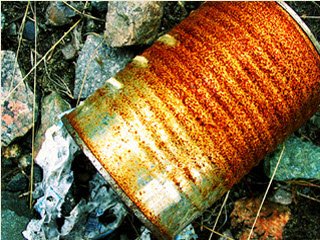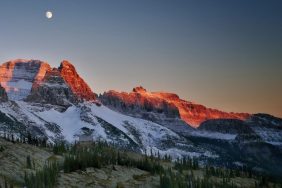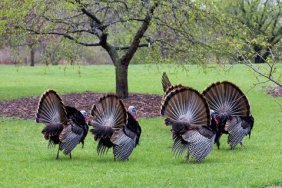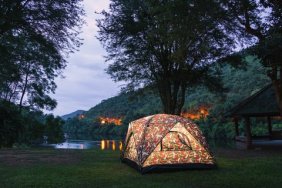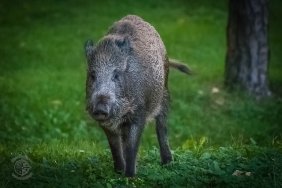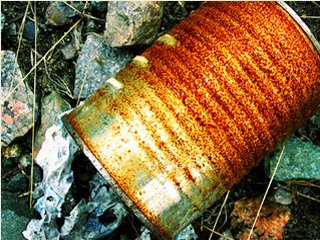 A few weeks ago I went for a backpacking trip into the mountains just outside Missoula, Montana. I visited an area managed by the U.S Forest service that borders the Flathead Indian Reservation and a national wilderness area. The trail took me 10 miles in to a secluded mountain lake walled in by a thousand foot cirque on nearly all sides. The trail getting there was obviously well used by packers and hunters in some spots, but the further in I went, the more the trail saw use from only stock and local wildlife. After all, 10 miles is a long way to hump a pack and firearm without stock support.
A few weeks ago I went for a backpacking trip into the mountains just outside Missoula, Montana. I visited an area managed by the U.S Forest service that borders the Flathead Indian Reservation and a national wilderness area. The trail took me 10 miles in to a secluded mountain lake walled in by a thousand foot cirque on nearly all sides. The trail getting there was obviously well used by packers and hunters in some spots, but the further in I went, the more the trail saw use from only stock and local wildlife. After all, 10 miles is a long way to hump a pack and firearm without stock support.
I passed only two people the whole day in. A pair of elk hunters were on the way out and I chatted them up about their as yet unsuccessful hunt. They said they had just been camping at a small lake up the trail and were now headed back out of the valley to focus on another area.
Another four miles up the trail I found an unopened granola bar on the ground. As I stopped to pick it up, I realized I had made it to the next lake. Following a small spur trail to the shore, the smell of wood smoke filled my nostrils as I made my way to a campsite right on the bank of the lake. To my surprise, red hot coals still smoldered in the vacant site’s fire pit! A several thousand acre fire had been burning for weeks just outside Missoula, and another was just 10% contained in the Bitterroot mountains at the time and yet these guys had saw fit to leave this fire hot and unattended for several hours with a plentiful water supply with which to douse it just feet away. As I got closer, I noticed various pieces of trash in and around the fire ring. Aluminum candy wrappers, a soup can, and hundreds of sunflower seed hulls littered the ground. Several dozen pine boughs had been cut to create a bed that had not been dispersed after breaking camp, and the head and tail of a cutthroat lay on the bank just a stride away.
Needless to say I was disgusted. And a bit confused.
Resisting the temptation to turn this story into a rant, I’ll instead focus upon a single incongruous bias that has always puzzled me about hunters like this. The apparent mutual exclusion between being a hunter AND an environmentalist has never fully been clear to me. Theodore Roosevelt is often touted as the prototype outdoorsman, yet it seems that hunters like the ones I encountered seem to forget that he was not only a hunter, but arguably the father of the modern conservation movement. Gifford Pinchot, a staunch believer in managing public lands for the greater good and multiple use by the American people often had Roosevelt’s ear when it came to crafting policy. Yet John Muir, the father of the preservationist movement in favor of leaving nature unadulterated by man certainly had Roosevelt’s heart. This battle of preservationist v.s conservationist has been raging ever since, and is more nuanced and philosophically complex than I can delve into here. But the salient concept is that simultaneous-multiple use of public lands does not extend to creation of rubbish piles and wanton destruction by negligence caused fires. I think most people know this, but what many people do not think about is that some user groups are, in fact, excluded from areas based upon behavior and impacts.
Snowmobiles are no longer allowed to be run in Yellowstone National Park without a permit and professional guide because of a failure to self-police those who were harassing wildlife and using highly polluting two-cycle snowmobiles. Offroad vehicles are restricted from wilderness areas because of the damage to ecologically sensitive areas (and other more philosophical reasons). And ATV’s are similarly not allowed on many public lands. There are dozens of user groups that are restricted in a variety of ways because of the actions of an irresponsible few, and the bottom line is that if hunters want to continue to share use of public lands with backpackers, climbers, kayakers, bird-watchers, skiers, hippies and hobos, then demonstrating that the impacts of our use are sustainable should be the first priority. Yes, first even above bagging game. With land use restrictions in constant flux and debate as much as ever before, the old guard of bias and labels need to be reevaluated so that hunters can maintain their position as a viable and relevant user group. So while most hunters would be just as disgusted as I was to find a camp in such a condition, we need to go the extra mile to actually pick up the slack (and the garbage) left by those less aware.
As I quickly doused the red hot coals on the lake-shore, dispersed the pine boughs throughout the surrounding forest and jammed the irresponsible pair’s garbage into my pack for the eventual trip out, I imagined the names they might have called me as I did so. But then I smiled and felt confident in the fact that as a man calling myself a hunter, it was not only acceptable, but my responsibility to call myself a tree-hugger too.
